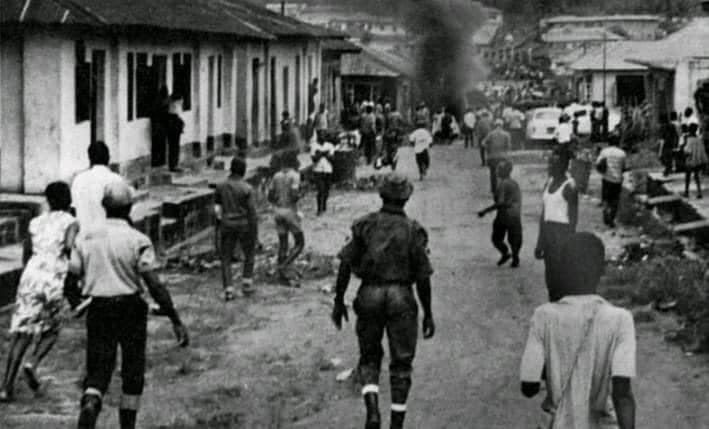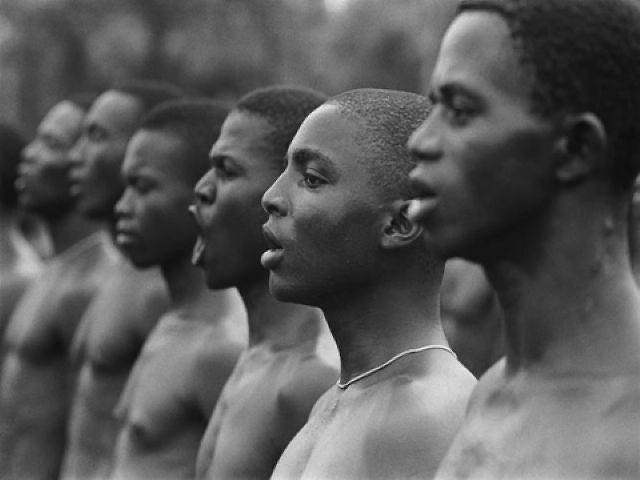The Forgotten Blood of Freedom
October 1967.
The harmattan wind drifted across Asaba, carrying dust and fear. Mothers gathered their children indoors, fathers whispered prayers. Rumours had travelled faster than sound, the federal troops were near.
They came not as liberators, but as reapers.
Under the white flag of surrender, men and boys were told to assemble at Ogbe-Osowa Square. They came wearing their best clothes, believing peace had arrived. But what followed was a slow, methodical slaughter.
Gunfire shattered the morning.
Bodies fell in waves.
The Niger, wide and silent, watched as the riverbank turned red.
That day, freedom died quietly, not in the battlefield, but in a town that believed peace still meant safety. And today, as Nigeria marks 65 years of independence, the question lingers: what kind of freedom buries its own sons?
The Day the River Turned Red

Asaba was not a front line. It was a home, a place of laughter, trade, songs, and river winds. Yet, in a few hours, it became a graveyard.
Eyewitnesses say the soldiers laughed as they shot. The air thickened with gun smoke and screams. Some boys tried to run into the Niger but were caught by bullets before the water could take them. Mothers stood still, too broken to even cry.
The river, that gentle companion of their lives, flowed on. It carried with it the blood of innocence, the dreams of sons, the grief of mothers. The Niger became both a witness and a tomb, holding within it the memory of a nation that devoured its own.
The massacre wasn’t just an act of war. It was an act of memory erasure. It was a message. A message that taught a cruel truth; that even peace could be punished, even surrender could be fatal.
Freedom’s Shattered Reflection
Seven years earlier, in 1960, Nigerians danced under a rising flag. They called it independence, the birth of a new dawn.
But the promise of liberty soon turned to betrayal.
The same flag that once symbolized unity became a weapon of division. The bullets that rained in Asaba were not fired by colonizers, but by brothers. Independence, once so bright, became a fractured mirror, showing a nation still chained to violence and fear.
What happened in Asaba wasn’t just a massacre; it was the disintegration of the Nigerian dream. It proved that freedom written on paper means nothing if justice is erased in blood.
Silence as a Second Death
After the gunfire stopped, the silence began.
The bodies were buried in shallow graves, and the story was buried deeper still.
For decades, Asaba did not appear in history books. No government monument marked the spot where freedom was shot down.
In Nigeria, silence often follows tragedy, the type of silence that kills twice.
And so, generations grew up knowing little of what happened by the river.
Freedom was buried once beneath bullets, and buried again beneath denial.
But memory is a stubborn thing. It waits. It resurfaces.
The Echo in Today’s Streets
Asaba was not an isolated wound, it was the beginning of a pattern.
Every era has its massacre: Odi Massacre of 1991, Zaki Biam Massacre of 2001, Lekki Toll Gate Shootings of 2020.
Different places. Different times. The same story; citizens shot, truth denied, justice forgotten.
The same bloodline of silence connects them.
When the Asaba mothers wept, there were no cameras. When the Lekki protesters sang the anthem under gunfire, there were.
Yet the aftermath was the same; denial, gaslighting, silence.
We say Never Again, but every generation finds its own Asaba.
Memory as Resistance
To remember is to rebel.
Every name recalled, every story retold, becomes a form of resistance against erasure.
For decades, Asaba’s survivors fought to be heard, to name their dead, to mark their pain. Not for revenge, but for recognition.
Because a nation that forgets cannot be free.
Freedom is not the absence of chains, it is the presence of memory.
When we tell the story of Asaba, we are not just recounting tragedy; we are reclaiming truth from the silence that tried to bury it.
The River as Witness
The Niger has seen everything. It has seen kingdoms rise, empires crumble, colonizers come and go.
But on that 7th day of October, it became more than water. It became a mirror, reflecting the soul of a wounded country.
If the river could speak, it would ask why we celebrate freedom while ghosts still float beneath its surface.
It would remind us that the story of Nigeria cannot be complete without the story of Asaba, for the river remembers what the nation tries to forget.
Even today, the Niger still glows faintly red when the sun sets, a glow not from dusk, but from memory.
The water carries whispers of men who believed peace meant survival, and of a freedom that drowned before it could grow wings.
Freedom was buried in the Niger. But maybe, just maybe, it still flows beneath, waiting for a nation brave enough to dive deep, face its reflection, and rise renewed.Freedom isn’t born from flag-raising or anthems.
It’s born from remembrance, remembrance from a people brave enough to confront their ghosts and tell their truth.
